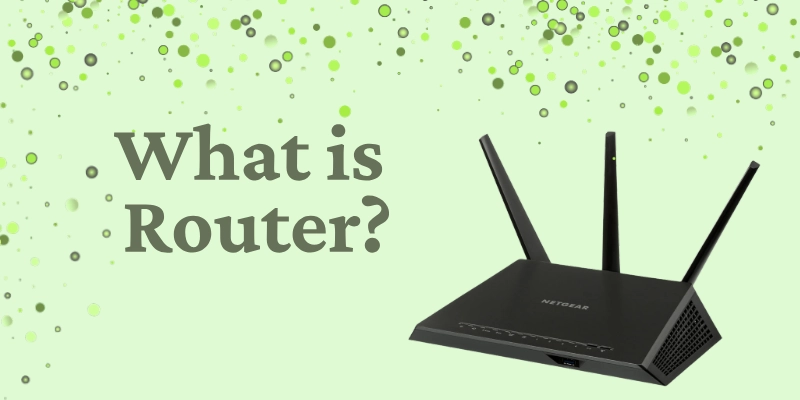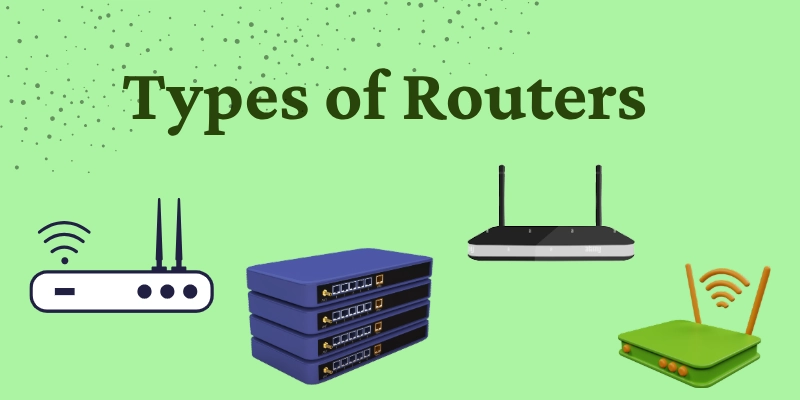What Is Router? Types, Functions & Complete Guide
Published: 2 Sep 2025
Did you know that every device connected to the internet relies on a router to communicate? From smartphones to laptops, the router is the core device that directs traffic between networks. If you’ve ever wondered what a router is and why it is so essential in computer networking, this guide will give you a clear and simple explanation.
Routers act as the backbone of connectivity by ensuring that data travels safely and efficiently to the right destination. Whether you are streaming videos, making video calls, or simply browsing the web, your router works silently in the background to manage traffic and prevent overload. Without it, the internet experience would be chaotic and unreliable.
In this article, we will discuss what is router in detail so you can understand how it works and why it matters..
What Is a Router in Computer Networks?
A router is a networking device that connects two or more networks and directs data packets between them. Simply put, it works like a traffic manager, making sure your information takes the best possible path to reach its destination.
- In technical terms, a router forwards data between computer networks based on IP addresses.
- In simple words, without a router, your devices could not share one internet connection or communicate with each other.
So, when you hear people ask what a router is in CN (computer networks), the answer is: it is the device that enables multiple computers and devices to access the internet and exchange data efficiently.

How Does a Router Work?
Routers operate by analyzing the destination IP address of each data packet. Using a routing table, the router decides the best path for sending data.
Think of it like a GPS system:
- Your device sends data → Router checks the address → Router chooses the best route → Data reaches its target.
Modern routers also manage multiple devices at once, prioritize traffic (for example, streaming over downloads), and provide added security through built-in firewalls.
Types of Routers in Networking
Routers come in different forms depending on where and how they are used. The main types include:
- Core Routers – High-capacity devices used by large organizations and internet providers to manage heavy traffic.
- Edge Routers – Connect an internal network to external networks like the internet.
- Wireless Routers – Common in homes and offices; they provide Wi-Fi along with routing.
- Virtual Routers – Software-based routers used in cloud computing and virtualization environments.
When people search for routers in computer networking, they usually want to understand these categories and their uses.

Router vs. Other Networking Devices
It’s common to confuse routers with other network devices, but they each have unique roles:
- Router vs Switch: A switch connects devices within the same local network, while a router connects different networks.
- Router vs Bridge: A bridge merges two networks into one, but a router directs traffic between separate networks.
- Router vs Gateway: A gateway translates protocols, while a router only handles IP traffic.
This distinction makes routers a critical part of any computer network.
Uses of Routers in Everyday Life
Routers are everywhere, from homes to enterprises. Here are the main uses:
- At Home: Provide Wi-Fi, connect multiple devices, support online gaming, and allow file or printer sharing.
- At Work: Ensure secure internet access, filter traffic, enable VPNs, and connect offices across different locations.
Without routers, smooth internet access and safe communication between devices wouldn’t be possible.
Advanced Features of Routers
Modern routers go beyond just connecting devices. Some advanced features include:
- Quality of Service (QoS): Prioritizes important traffic like video calls.
- Security: Built-in firewall and parental controls.
- Guest Networks: Allows visitors to connect without accessing your main network.
- Port Forwarding: Helps with gaming servers and remote access.
These features make routers powerful tools for both personal and professional networking.
Why Routers Are Important
Routers are not just optional devices, they are the backbone of modern networking. They keep information flowing smoothly between computers, phones, and the internet. From small homes to global businesses, routers make sure communication stays fast, reliable, and secure.
With the rise of cloud computing and smart homes, the role of routers in networking will only grow stronger.
Conclusion
So, in this article, we’ve covered what is router in detail. Routers are the backbone of modern networking, and knowing how they work can help you make smarter choices for your home or business setup. Personally, I suggest investing in a quality router with strong security features to ensure reliable performance and data protection. If you’re ready to take your knowledge further, check out our other networking guides and stay updated with the latest tech tips.
✨ We’d love to hear your thoughts! Share your questions or experiences with routers in the comments below, and let’s keep the conversation going.
FAQs
Following are some of the most common FAQs about routers that beginners often ask. These simple questions and answers will help you clear up any confusion and understand routers better.
A router is a device that connects your devices (like phones, laptops, and TVs) to the internet and to each other. It directs data to the right place, just like a traffic manager. Without it, you wouldn’t be able to share one internet connection among multiple devices.
A modem connects your home to the internet provided by your ISP, while a router distributes that connection to multiple devices. The modem brings the internet in, and the router shares it out. Many modern devices combine both functions into one box.
Yes, because Wi-Fi is just the wireless signal your devices use, and the router is what actually creates and manages that signal. Without a router, there’s no Wi-Fi network to connect to. The router also provides security and traffic management.
Yes, a router can still connect devices together on a local network, like for file or printer sharing. However, without the internet, you won’t be able to browse websites or stream online content. So it works, but with limited functionality.
The main types are core routers (used by ISPs), edge routers (connecting networks to the internet), wireless routers (common in homes), and virtual routers (software-based). Each serves a different purpose. For most users, a wireless router is the most common.
If your internet feels slow, the connection drops often, or your router doesn’t support the latest Wi-Fi standards (like Wi-Fi 6), it might be outdated. Older routers also lack modern security features. Upgrading ensures faster speeds and safer browsing.
Technically yes, but it depends on the size and needs of your network. Home routers are fine for a few devices, while offices usually need stronger routers with advanced security and traffic management. Choosing the right one avoids slowdowns and risks.
The router’s main function is to forward data between devices and networks. It makes sure your emails, messages, and streaming data reach the right destination quickly. It also adds layers of security and traffic control.
A router doesn’t make your internet connection faster than what your ISP provides, but a good one can help you use that speed more efficiently. It reduces bottlenecks and handles multiple devices better. So in practice, yes—it can feel faster.
Check your internet speed, the number of devices you’ll connect, and your coverage area. Look for features like dual-band Wi-Fi, security options, and parental controls. Choosing a router that matches your needs ensures smooth and secure connectivity.

- Be Respectful
- Stay Relevant
- Stay Positive
- True Feedback
- Encourage Discussion
- Avoid Spamming
- No Fake News
- Don't Copy-Paste
- No Personal Attacks

- Be Respectful
- Stay Relevant
- Stay Positive
- True Feedback
- Encourage Discussion
- Avoid Spamming
- No Fake News
- Don't Copy-Paste
- No Personal Attacks





